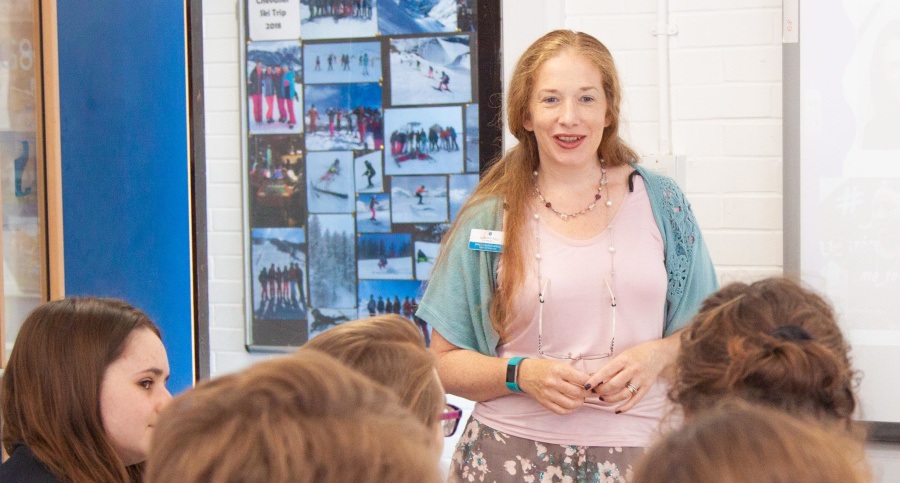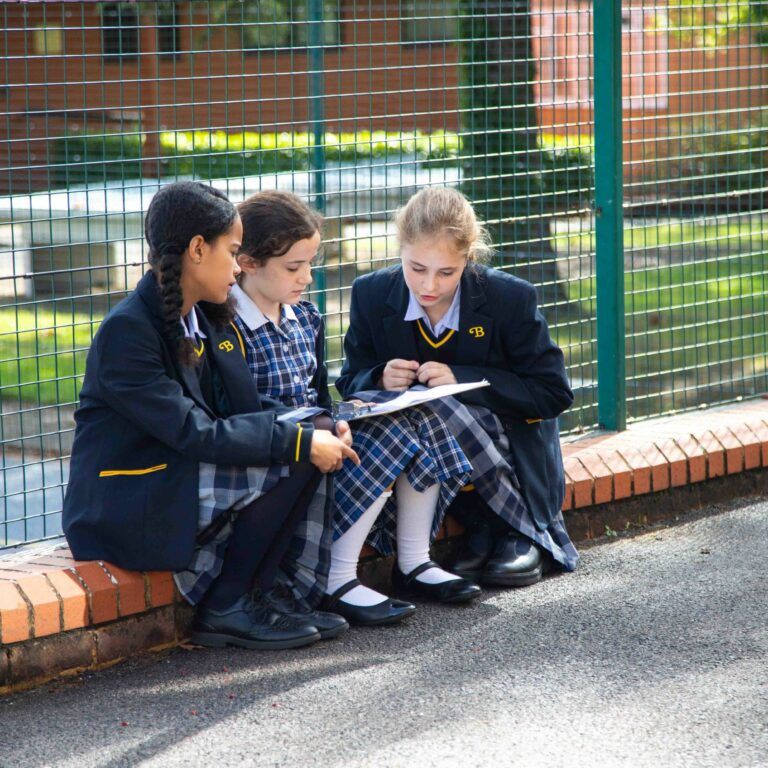In this staff view, Sarah Kruschandl, Head of Partnerships and Head of English at Burgess Hill Girls, explains why oracy is important.

Sir Keir Starmer recently brought oracy education into the spotlight, making a manifesto promise to develop students’ spoken language skills. Highlighting the difference between the state and independent sector, he recognised how public speaking is integral to independent schools, claiming this is the reason for the characteristic confidence and eloquence of privately educated students.
What is Oracy?
Speech is central to education but is a multifaceted issue. In schools, students learn to talk and talk to learn. Research from the Education Endowment Foundation shows that oral language teaching interventions ‘have a high impact on student outcomes’. Oracy to aid teaching is explored by Tom Sherrington in Walk-thrus, and Barbara Bleiman from the English and Media Centre.
Starmer’s plan centres, however, around performative talk, as he stated in an article published in The Times, “The ability to speak well and express oneself should be something that every child is entitled to and should master.” At the heart of his approach lies a keen emphasis on public speaking. Public speaking often evokes fear in both adults and children alike. However, embracing opportunities for public speaking is a powerful means of conquering this fear and cultivating the confidence to express oneself effectively.
Effective spoken communication and self-expression rely on a combination of cognitive, linguistic, physical, social, and emotional skills. Orators with well-developed cognitive skills can skilfully articulate their opinions, carefully organising their ideas to ensure that their thoughts are conveyed precisely and clearly. Schools play a crucial role as linguistic role models, expanding students’ vocabulary. By balancing eloquence and powerful language, effective orators add impact, fluency and an air of authority. Central to the cultivation of advocacy skills and the composition of fluent speeches is the mastery of rhetoric and the ability to present cogent arguments.
The mastery of spoken language hinges on verbal skills, including articulation, expression, pitch, tone, and projection; as well as non-verbal cues, such as gestures and body language. Through exposure to a variety of contexts, individuals enhance their understanding of different individuals, social interactions, and the art of active listening, enabling them to effectively respond to questions and engage with others. Lastly, effective orators possess emotional intelligence. By harnessing emotional intelligence, they can connect with their audience on a deeper level and deliver impactful messages. Confident speakers understand the significance of their opinions and recognise that their voice holds weight and value.
Why should we teach oracy?
The significance of oracy extends beyond education to the workplace, where strong speaking and listening skills are pivotal for collaboration, leadership, client interactions, and problem-solving. Geoff Barton, general secretary of the Association of School and College Leaders, speaking to the Guardian said, “We need to equip young people with the tools they need to thrive when they leave school.” Interviews are constructed around speaking and listening; the best orators get the job. Effective communication is also essential for building professional relationships and expanding networks. For leaders, the rhetorical art of writing and delivering a speech is essential. Leaders need strong oracy skills to inspire and motivate their teams, effectively share their vision, influence others and facilitate productive conversations to drive the organisation forward.
In the new era of AI, oracy skills will become more significant. AI systems excel at processing and analysing vast amounts of data and algorithms, which limits their ability to fully comprehend contextual cues, subtle nuances, and complex communication. Oracy skills allow individuals to express abstract ideas, navigate ambiguity, and convey emotions effectively.
What role has oracy previously played in education?
At Burgess Hill Girls, talk is a teaching tool used by all teachers: students frequently work in pairs and groups, they learn to speak up in classroom discussions and are asked to lead lessons and present to their class.
Oracy is one of the three skills taught in English. Often side-lined by the seemingly more important skills of reading and writing, over the years various governments, educational specialists and academics have fought to prioritise spoken language. Aristotle wrote about The Art of Rhetoric in the 4th Century BC. The term ‘oracy’ was coined in 1965 by Andrew Wilkinson who promoted the teaching of this skill. Renamed as ‘speaking and listening’ in the 1980s National Curriculum, this and the subsequent government-funded projects (National Oracy in 1987 and the Language in the National Curriculum 1989) highlighted the significance of communication skills for student’s personal and academic development. These projects were abandoned in 1990, but the National Curriculum in 1999 re-introduced ‘communication’ as an essential skill. Initiatives from 2002, such as ‘Talk for Writing’, focused on teachers using talk to improve learning. The Department for Education revised the Teachers’ Standards in 2011, specifying that all teachers should promote high standards of ‘articulacy’. Speaking and listening coursework was introduced to the English Language GCSE in England in 2000, but in 2014 a ‘spoken language’ component replaced it; this is assessed but does not count towards students’ final Language grades.
Why is oracy particularly important to girls’ education?
At Burgess Hill Girls we encourage students to find their voice and to have the confidence to express their opinion. This is perhaps even more pertinent in an all-girls setting. In linguistic studies, it has been shown that men dominate conversations. For example, when a woman or girl introduces a new topic groups are more likely to ignore the suggestion, whereas groups will invest in any new topic a man introduces. Such biases show how society encourages men to express their opinions and women to be silent. While men are expected to share their views, we still hear women who frequently speak out called ‘opinionated’ or ‘difficult’. This is one of the ways that gender norms are ingrained. Society incentivises conformity to gender-appropriate behaviour, rewarding individuals who adhere to these norms while penalising those who deviate from them. In an all-girls school setting, such challenges are removed: girls’ voices are heard. This enhances confidence, capability and normalises self-expression so that these girls grow up to be women who expect to share their opinions and for others to listen. Sheryl Sandberg (Vice Principle of Google in 2001 and Chief Operating Officer of Facebook in 2009) said, “I want every little girl who someone says ‘they’re bossy’ to be told instead, ‘you have leadership skills’”. She encouraged women to ‘Lean-In’ and speak when they are at the board-room table.
How do we teach oracy at Burgess Hill Girls?
At Burgess Hill Girls students have many opportunities for public speaking. They can speak in front of the school in assemblies, opt for private lessons and qualifications in speech and drama; take prospective families on tours; and deliver formal speeches in interviews for scholarships and school leadership positions, such as to join the student council or the Head girl team.
In English lessons, half a term in each year group is devoted to developing the art of spoken communication. In a carefully constructed scheme of work which spans four years and maps the core oracy skills, students develop confidence, to speak with conviction and capability.
At the end of their first year in the Senior School, Year 7 students work in small groups to create a pitch – a presentation to the school council which recommends an improvement to the school, applying their newly acquired rhetorical skills.
Students in Year 8 are taught how to structure and compete in formal debates, using the British parliamentary style. They are taught about Aristotle’s modes of persuasion, rebuttals, points-of-information and whips. Each girl works in a team and delivers a three-minute speech during an assessed debate.
Year 9 girls study some of the most influential speeches from the feminist movement and then create a speech about an issue affecting girls and women today, either in the UK or around the world. They are taught how to research, compose and deliver a powerful speech.
In Year 10 students prepare a speech on a topic of their choice and after delivering their speech, respond to questions from the audience. This recorded speech is their spoken language assessment which is an endorsement of their Language IGCSE.
Does Burgess Hill Girls offer extra-curricular oracy clubs?
School debating clubs are central to the development of oracy practice. These extension clubs offer girls the opportunity to further develop their public speaking skills, confidence and ambition, as they compete against pupils from other schools in national knock-out competitions.
The school hosts the annual Rotary Public Speaking competition. ‘Youth Speaks’ which is a supportive introduction to debating competitions. Each team chooses a topic, researches, writes and rehearses their speeches which they present before an audience and a panel of judges.
Developing their knowledge of the world, teams have a month to research and prepare a controversial subject or current affair in the English Speaking Union Schools’ Mace competition before competing against other schools, requiring them to listen, challenge and respond.
Our more able orators compete in ‘short-prep’ debates which refine their oracy skills as well as their cognitive abilities to think quickly, solve problems and analyse arguments. The Oxford Schools Debating Competition is one such example, where teams compete with only 15 minutes preparation time on the topic before the debate starts.
Final thoughts
The importance of oracy skills in education, personal development, and the workforce cannot be overstated. The recognition of oracy’s significance in the independent sector reflects the growing awareness of its benefits. Through initiatives like public speaking, group discussions, and specialised speech and drama lessons, schools like Burgess Hill Girls empower students to find their voices, express themselves confidently, and develop crucial communication skills. The integration of oracy skills into educational curricula and beyond is essential for empowering individuals to communicate effectively, express their opinions, and thrive in an increasingly interconnected world.


